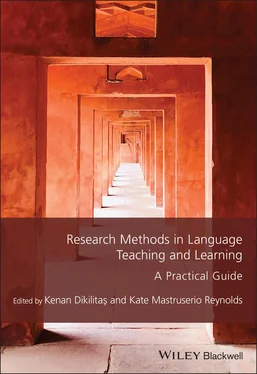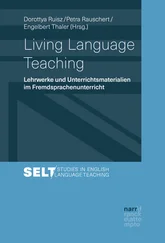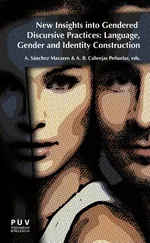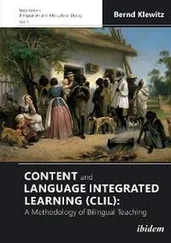Research Methods in Language Teaching and Learning
Здесь есть возможность читать онлайн «Research Methods in Language Teaching and Learning» — ознакомительный отрывок электронной книги совершенно бесплатно, а после прочтения отрывка купить полную версию. В некоторых случаях можно слушать аудио, скачать через торрент в формате fb2 и присутствует краткое содержание. Жанр: unrecognised, на английском языке. Описание произведения, (предисловие) а так же отзывы посетителей доступны на портале библиотеки ЛибКат.
- Название:Research Methods in Language Teaching and Learning
- Автор:
- Жанр:
- Год:неизвестен
- ISBN:нет данных
- Рейтинг книги:5 / 5. Голосов: 1
-
Избранное:Добавить в избранное
- Отзывы:
-
Ваша оценка:
- 100
- 1
- 2
- 3
- 4
- 5
Research Methods in Language Teaching and Learning: краткое содержание, описание и аннотация
Предлагаем к чтению аннотацию, описание, краткое содержание или предисловие (зависит от того, что написал сам автор книги «Research Methods in Language Teaching and Learning»). Если вы не нашли необходимую информацию о книге — напишите в комментариях, мы постараемся отыскать её.
Research Methods in Language Teaching and Learning
Research Methods in Language Teaching and Learning
Research Methods in Language Teaching and Learning — читать онлайн ознакомительный отрывок
Ниже представлен текст книги, разбитый по страницам. Система сохранения места последней прочитанной страницы, позволяет с удобством читать онлайн бесплатно книгу «Research Methods in Language Teaching and Learning», без необходимости каждый раз заново искать на чём Вы остановились. Поставьте закладку, и сможете в любой момент перейти на страницу, на которой закончили чтение.
Интервал:
Закладка:
Critical Review of the Literature: Identifying a Space for Exploration
The aim of educational research is to contribute to our knowledge of how to improve the effectiveness of education and studies should therefore promote the generation of practical implications that are likely to improve the quality of learning and teaching. However, there are many studies that fail to do so since their findings are limited to describing a situation, diagnosing a problem, and/or revealing relationships between different constructs. This indicates that some researchers ignore actual practical classroom problems.
As discussed in my dissertation (Uztosun, 2013), although teaching speaking was a major issue in ELT in Turkey, to the best of my knowledge no study had been conducted to investigate teaching EFL speaking through a research methodology that could generate practical implications. My study addressed this gap; within Turkey it was the first study based on action research methodology in an EFL speaking class. These preoccupations parallel the main purpose of grounded theory methodology, which is guiding researchers to develop theoretical understanding by focusing on their data rather than relying on existent theories (Perry, 2005). This perceptive was important for this study because theoretical assumptions were limited to the characteristics of effective EFL speaking classes and positive outcomes of student negotiation. For that reason, I needed to draw new theoretical knowledge from my data regarding the implementation of student negotiation in an EFL speaking classes. This knowledge allowed me to achieve my research objective, which was generating practical implications to foster student engagement in EFL speaking activities.
Making Methodological Choices
When I informed my supervisors about my concerns regarding the situation in ELT in Turkey, they suggested conducting an action research study since my concern was in line with the general objective of action research – to improve classroom practice (Kemmis, 2009; Kemmis & McTaggart, 1988; McKay, 2006). Action research is defined as “the study of a social situation with a view to improving the quality of action within it” (Elliott, 1991, p. 69). Echoing this, Kemmis (2009) terms action research as “practice-changing practice” ( p. 464). It allows the researcher to carry out a systematic study to act and reflect on a problem that impedes the effectiveness of classroom teaching (Burns, 2010a; Ebbutt, 1985). The problem in my context was obviously a lack of effective speaking classes at different times that promoted students’ EFL engagement in speaking activities. Action research made it possible to take systematic steps to understand, evaluate and improve classroom practice in an EFL speaking setting (Bassey, 1998; Frost, 2002; McKay, 2006).
Considering that external agents may not know the situation of the class, action research studies are carried out with the involvement and collaboration of the teacher (Hammersley, 2004; Nunan, 1992). I was fortunate in that one of my colleagues in the ELT department at a university agreed to take part in my study. She was the lecturer of the Oral Communication Skills course that is offered to first-year university students at the department. This therefore made it possible for me to conduct the study in a real EFL speaking class.
After reaching a consensus on implementing action research methodology, my supervisors and I discussed which action research model to follow. In doing so, we considered whether the model would allow for the implementation of grounded theory and decided to adapt Elliott’s (1991) and Kemmis and McTaggart’s (1988) models. The reconnaissance phases (i.e., fact finding) included in Elliott’s model seemed an appropriate step to develop theoretical understanding of classroom context and uncover instructional problems before taking actions. Therefore, we decided to include a 4-week reconnaissance phase, in which I would observe classes and collect data from the teacher and students to become familiar with the research context.
We used Kemmis and McTaggart’s (1988) model in our weekly based interventions, because the model paralleled the principles of grounded theory in terms of designing research interventions based on the interpretations of the data. I conducted eight interventions, in which student negotiation was implemented by following planning, acting, observing, and reflecting stages of the model.
The final week of the research was critical, because it generated the outcomes of grounded theory by means of drawing conclusions and developing a new theoretical hypothesis based on the data collected throughout the term. To do this, I collected data from the teacher and students using different data collection methods in order to understand their perspectives of the effectiveness of implementing student negotiation in EFL speaking classes, and this allowed me to develop a new idea about the effectiveness of student negotiation in increasing student engagement in EFL speaking activities. These procedures led to a three-stage action research approach: reconnaissance phase (Stage 1), student negotiation (Stage 2), and developing a new idea (Stage 3).
Research Framework
Research Questions
Qualitative research design provides researchers with the flexibility to make changes in their research procedures: they can change the scope of their research when it is necessary to collect different types of data using different data collection methods. This is based on the assumption that learning is context- and individual-dependent and it is difficult to anticipate issues that could emerge in a research study.
Given that grounded theory centers on research data as a means to develop theoretical hypotheses, it may not be appropriate to write specific research questions without interpreting any data. The mainstay of this assumption resides in the fact that researchers cannot anticipate what is worth investigating in a particular research context. Therefore, they should be flexible in their research scopes and need to acknowledge new issues that emerge from the data. Otherwise it could be difficult to develop hypotheses based on the data. With my supervisors, we took this perspective in writing the research questions.
Before data collection, I had one research question for Stage 1 (the reconnaissance phase): “What problems do Turkish EFL learners experience while speaking English?”; and one question for Stage 3 (developing a new idea): “In what ways is this action research procedure useful for providing students with opportunities to improve their speaking ability?” However, we were unable to anticipate what would happen during research interventions in which we implemented student negotiation and, therefore, we did not define the focus of our research. After collecting and interpreting the data collected in reconnaissance phase and during research interventions, we developed a new understanding of the constructs that seemed to discourage student participation in speaking activities. This knowledge allowed us to determine the focus of our research and write a further research question with five sub-questions: “In what ways does negotiation of activity types impact on students’ (a) perceptions of speaking ability, (b) classroom participation and performance, (c) anxiety level, (d) willingness to speak, and (e) self-esteem?”
Gaining Ethical Approval, Approaching the Participants
I received official ethical approval from the university, I also obtained the consents of participants by asking them to sign an informed consent form, in which I explained the general objectives of the study. I assured them that participation was on a voluntary basis and their identities would be protected. The questionnaire data were collected anonymously. I asked for permission to audio record the interviews and avoided asking sensitive and judgmental questions. The data were stored in my personal computer and audio files were deleted after transcribing.
Читать дальшеИнтервал:
Закладка:
Похожие книги на «Research Methods in Language Teaching and Learning»
Представляем Вашему вниманию похожие книги на «Research Methods in Language Teaching and Learning» списком для выбора. Мы отобрали схожую по названию и смыслу литературу в надежде предоставить читателям больше вариантов отыскать новые, интересные, ещё непрочитанные произведения.
Обсуждение, отзывы о книге «Research Methods in Language Teaching and Learning» и просто собственные мнения читателей. Оставьте ваши комментарии, напишите, что Вы думаете о произведении, его смысле или главных героях. Укажите что конкретно понравилось, а что нет, и почему Вы так считаете.












